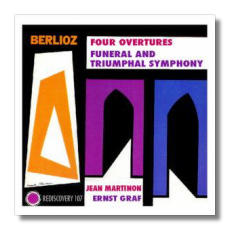
The Internet's Premier Classical Music Source
Related Links
- Berlioz Reviews
- Latest Reviews
- More Reviews
-
By Composer
-
Collections
DVD & Blu-ray
Books
Concert Reviews
Articles/Interviews
Software
Audio
Search Amazon
Recommended Links
Site News
 CD Review
CD Review
Hector Berlioz

- Funeral and Triumphal Symphony
- Overture "Roman Carnival" *
- Overture "King Lear" *
- Overture "Béatrice et Bénédict" *
- Overture "Corsair" *
Josef Rohm, trombone
Vienna Chamber Chorus
Vienna State Opera Orchestra/Ernest Graf
* Lamoureux Concerts Association Orchestra/Jean Martinon
ReDiscovery RD107 ADD mono 66:44
These recordings date from the early 1950s, and originally appeared in the United States on the Urania label. (ReDiscovery reproduces the original Urania logo on the insert cover. Depending on your frame of mind, it looks either like the beginning of a James Bond movie or a whirlpool – some have said it looks like a flushing toilet!)
The four overtures are conducted by Martinon shortly before he achieved international prominence. I've given up on any conductor making King Lear into a coherent musical experience, but Martinon's version comes closer than most. The orchestral playing lacks polish, and Martinon's interpretations are on the lusty side, but no one can complain that these readings are dead on arrival. They share something of Munch's transparency, but are heavier, more in-your-face. The important thing is that this is a French conductor leading French musicians in French repertoire during an era when this actually meant something. One feels that a performance tradition has been passed down from the time of Berlioz to the present performers. LP transfers of these performance were off-pitch, but David Gideon's miraculous digital remasterings set everything as right as can be. (A little bit of flutter probably was inevitable.)
Berlioz composed his Funeral and Triumphal Symphony to commemorate those who died during the 1830 revolution. The remains of the dead were transported to a monument in the Place de la Bastille, under the outstretched wings of Liberty. As such, the music was meant to be played outdoors. Later, Berlioz added strings and a final chorus proclaiming, "Glory and triumph for these heroes." It's a terrifically unsubtle piece, but it is beautifully written for a large wind band, and the composer was not ashamed of it. One might think that stereophonic sound were necessary to do it justice. Nevertheless, Urania's recording – at least as remastered here – packs a punch, particularly when the chorus enters near the very end. As with the overtures, there are a few scrambled moments which suggest less than optimal rehearsal time, but the performance makes a grand impression, and the Viennese winds are most impressive… and most French-sounding! It is quite possible that "Ernest Graf" is a made-up name. Josef Rohm really did exist, however, and he plays his long second-movement solo eloquently. (Chorus master Hans Gillesberger also was a real person.) A bit of surface noise is noticeable only in quiet passages, and should seriously bother no one. I would like to see a reissue of Désire Dondeyne's classic stereo recording of this work (once on Nonesuch); maybe ReDiscovery can give us that one too. (I am told that Dondeyne recorded the work in the 1950s for Westminster. Might "Graf" really be Dondeyne?)
As with other ReDiscovery issues, this is a no-frills CD-R with little to offer in terms of annotations or other niceties, but it's the music and the musicianship that count! The $15 price includes shipping and handling. ReDiscovery CDs can be purchased from their website: www.rediscovery.us.
Copyright © 2006, Raymond Tuttle












